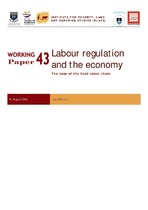| dc.contributor.author | Theron, Jan | |
| dc.date.accessioned | 2019-04-29T08:03:08Z | |
| dc.date.available | 2019-04-29T08:03:08Z | |
| dc.date.issued | 2016 | |
| dc.identifier.citation | Theron, J., 2016. Labour regulation and the economy: The case of the food value chain, Cape Town: PLAAS UWC and CoE UWC. | en_US |
| dc.identifier.uri | http://hdl.handle.net/10566/4650 | |
| dc.description.abstract | Contrary to a popular narrative which seeks to attribute the country’s economic ills to labour legislation, this paper argues that the role of law in relation to the economy is constitutive, and that labour can also not be considered in isolation from other branches of law in this regard. The regime constituted by labour law has also always had a dual character, in which there are ‘outsiders’ to which certain key provisions - specifically rights to organise and bargain - do not apply. To elaborate this argument, the paper considers the law’s role in structuring employment in the food value chain to show how key provisions of labour legislation, and other laws, fail to take into account how employment is increasingly externalised, and how the number of ‘outsiders’ is growing. The paper also considers the role of worker organisation and collective bargaining, and other regulatory strategies in the food value chain | en_US |
| dc.language.iso | en | en_US |
| dc.publisher | Institute for Poverty Land and Agrarian Studies (PLAAS) | en_US |
| dc.relation.ispartofseries | Working Paper;43 | |
| dc.subject | Constitutive role | en_US |
| dc.subject | Labour law | en_US |
| dc.subject | Worker organization and representation | en_US |
| dc.title | Labour regulation and the economy: The case of the food value chain | en_US |
| dc.type | Working Paper | en_US |

